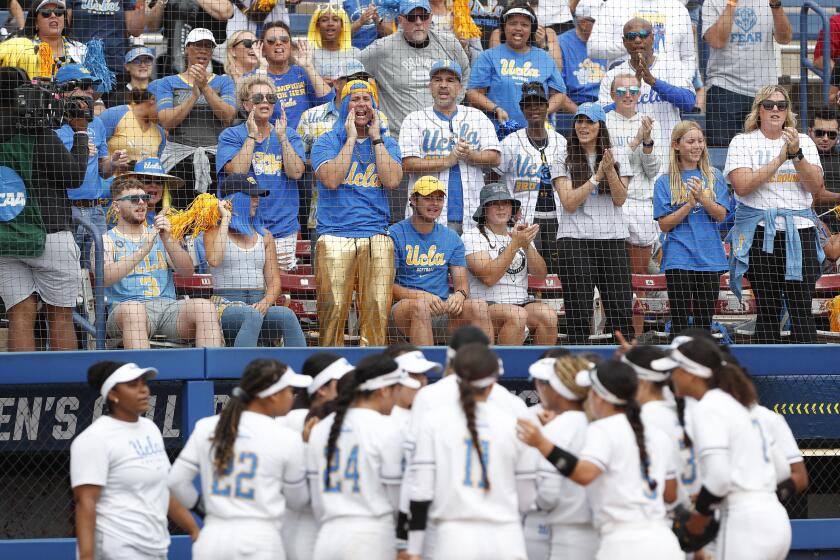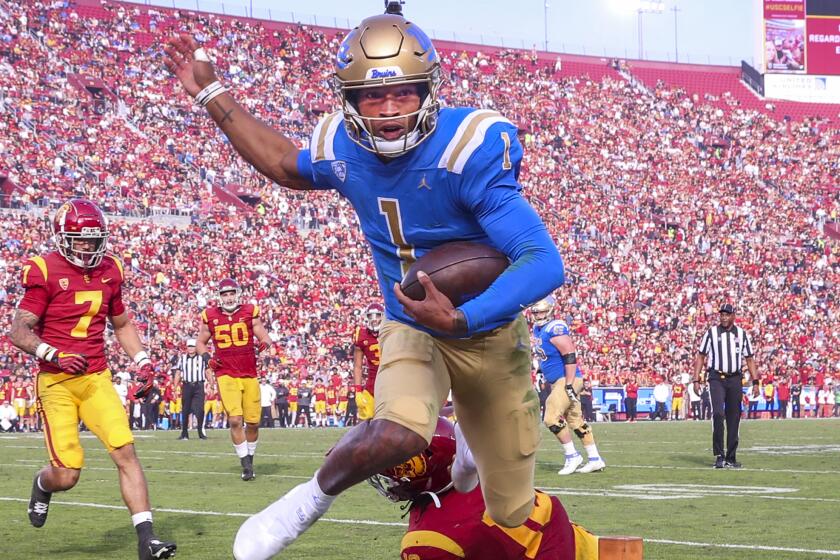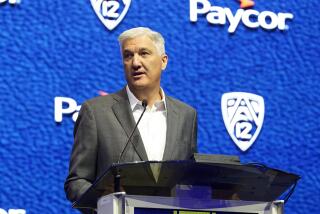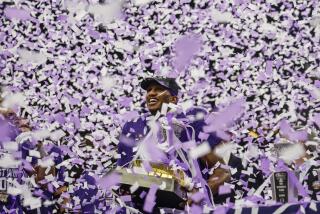George Kliavkoff got burned by USC and UCLA. Now he’s chasing a Pac-12 miracle
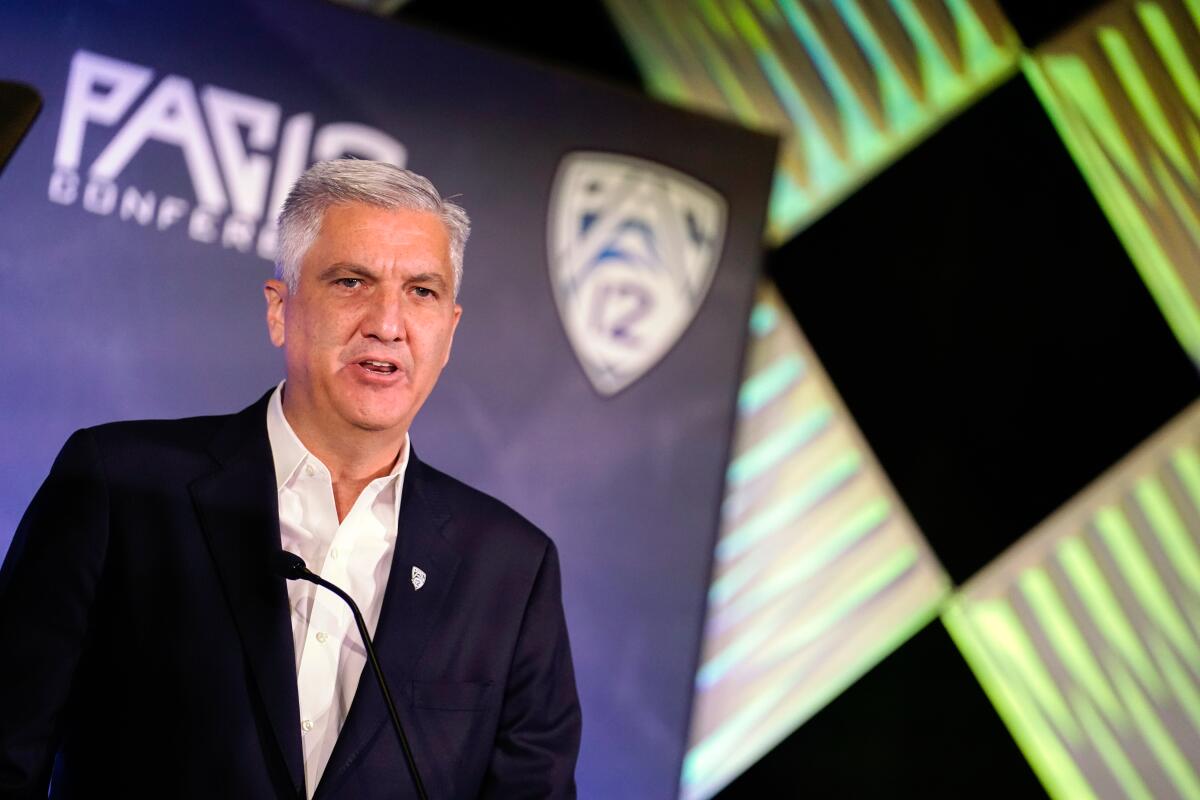
- Share via
Late last July at Pac-12 media day, I met George Kliavkoff in the lobby of the W Hollywood, looking for a reason to be optimistic about the league’s future after Texas and Oklahoma bolted the Big 12 for the Southeastern Conference.
The new commissioner provided it.
Kliavkoff, a big-time executive at MGM Resorts, was an unknown in college sports circles, sure. But the hope was that his unique outsider’s perspective would help the Pac-12 stop playing from behind and operate more proactively than reactively.
“I love it. I love the complexity,” Kliavkoff said of the realignment scenario. “It’s three-dimensional chess, and it’s fun to play.”
At that moment, Kliavkoff was fielding calls from distressed members of the Big 12 who were hopeful to attach themselves to the West Coast’s Power Five conference. If he could have gazed into a crystal ball and glimpsed the events of June 30, 2022 — USC and UCLA stunningly announcing they were leaving the Pac-12 for the Big Ten starting in 2024 — Kliavkoff probably would not have turned down the likes of Oklahoma State, Texas Tech, Baylor and Texas Christian.
Today, the Pac-12 is vulnerable to the poaching of better-positioned leagues. There’s an argument to be made the Big 12, which responded to losing Texas and Oklahoma by adding Brigham Young, Central Florida, Cincinnati and Houston, now offers more stability than the Pac-12.
Dennis Dodd of CBSSports.com reported Tuesday the Big 12 is talking this week with Arizona, Arizona State, Colorado and Utah. The pitch to those schools — a few of which have publicly refuted Dodd’s report — would be the Big 12 has a unified membership that already has accepted the Big Ten and SEC will not be pursuing them in expansion efforts. In the Pac-12, proud programs like Oregon, Washington and Stanford are undeniably open for business and hoping to join USC and UCLA in earning a cut of the Big Ten’s $1-billion-plus media rights package.
Why would the rest of the Pac-12 stay committed when they can’t reasonably trust the other faces staring back at them during Zoom meetings?
UCLA, saddled with $102.8 million in athletic debt, wasn’t sure it could keep fielding all sports before the moving from the Pac-12 to the Big Ten.
Given the disparity in conference revenue distribution between his league and the Big Ten and SEC, Kliavkoff had to know there was a chance at the very least that USC — his lone blue-blood football program — could leave for a more lucrative home and that there would be nothing he could do to stop the Trojans.
Well, it happened, and UCLA left too. Now we will find out whether Kliavkoff can actually play chess.
“He’s good at navigating ambiguity, when you don’t know what the answer is but you know there’s a lot of disruption,” Beth Comstock, who brought Kliavkoff in as chief digital officer at NBC Universal around 2006, told me last summer. “That’s why we hired him at NBC. Out the other end came something that’s withheld the rest of [the] time.”
That something she referred to is Hulu, the successful streaming platform. As I wrote last summer, “Kliavkoff’s past is packed with instances of making moves that seemed obvious to him and weren’t pursued as quickly by competitors.”
From this point on, keeping the Pac-12 from dissolving and getting the league in some form into a new media rights agreement would qualify as Kliavkoff’s crowning business achievement.
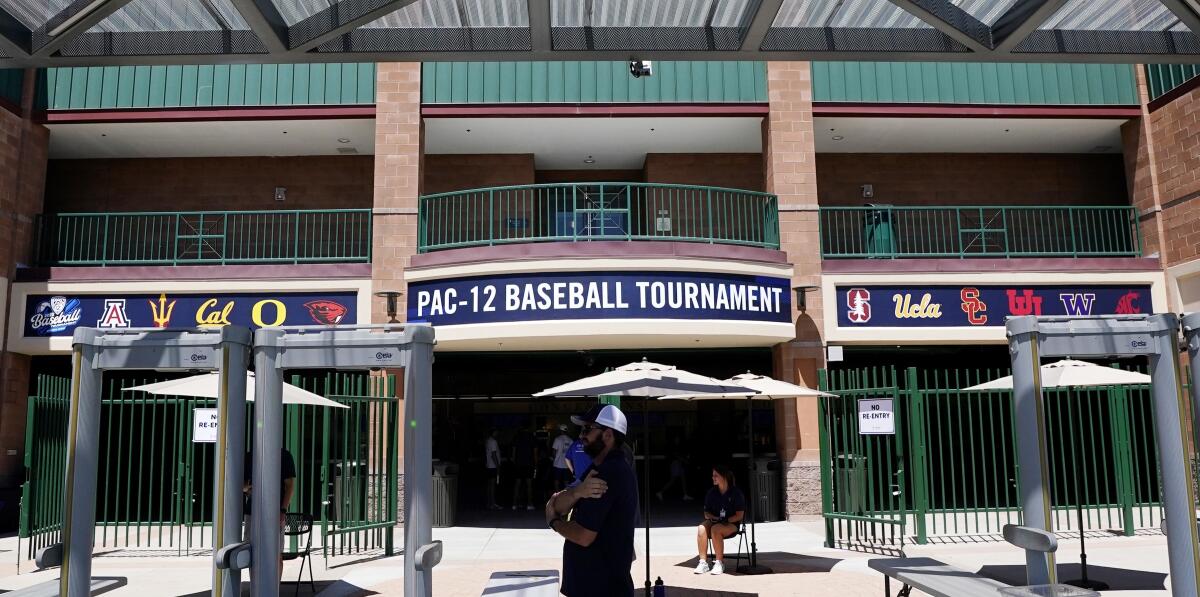
He was dealt a losing hand from his predecessor, Larry Scott, and, by not pursuing expansion with the Big 12 schools last summer, he ended up losing more. Kliavkoff’s mistake was putting his faith in USC to stay loyal during an era of college sports in which there is no such thing as loyalty.
Surely he’s learned that lesson, which can only help him going forward. If Kliavkoff shows up to this year’s Pac-12 media day July 29 and the league still has 10 members publicly signed up for 2024 and beyond, I’ll call that an early victory.
So far, the Pac-12 is doing what all leagues do in this scenario. It announced its schools authorized the conference office to seek expansion options and start negotiating the conference’s next media rights package. The message being sent is that all 10 schools are committed to one another, which is what the remaining eight Big 12 schools did last summer. It ended up ringing true only because the league had no other options.
Current TV partners ESPN and Fox will have an exclusive window to negotiate with the Pac-12, but let’s remember that those networks have been the driving force behind SEC and Big Ten expansion the last two summers. Their priority is not saving the Pac-12, which Fox just showed by seizing the L.A. market for its Big Ten negotiations.
USC and UCLA are leaving the Pac-12 for the Big Ten Conference in 2024, the two schools announced Thursday.
College football is heading toward a breakaway of the top schools, which are going to be positioned in the Big Ten and the SEC. There is no more Power Five to protect. That’s over. If the “Power Two” were going to stop at 16 members, one could argue that the Pac-12 and ACC should merge so that Florida State, Clemson, Virginia Tech, Miami, North Carolina, Oregon and Washington could be under one roof, but it’s unlikely the Big Ten (Fox) and SEC (ESPN) are done picking from that pool.
The Big Ten can afford to wait out a decision from Notre Dame. Until there’s an answer out of South Bend, Oregon in particular is just going to have to learn to be comfortable being uncomfortable. And let’s not forget, Stanford could be more appealing as an 18th team. The Ducks could be pressured to commit to the Pac-12 or join a group of peers that head for the Big 12, but they might as well sign their name in pencil.
It is long past time for Pac-12 leadership to show some cunning. A checkmate given the current look of the board would go down in history as Kliavkoff’s Miracle.
More to Read
Go beyond the scoreboard
Get the latest on L.A.'s teams in the daily Sports Report newsletter.
You may occasionally receive promotional content from the Los Angeles Times.

